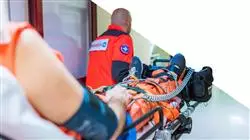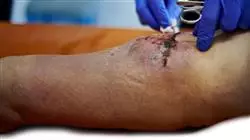University certificate
The world's largest faculty of medicine”
Introduction to the Program
This program is designed to respond to the current needs in emergency departments. Technology, organ donation, rare diseases, special needs patients, high-risk respiratory infections and other challenges in the emergency department are some of the topics that will be addressed in this Professional master’s degree”

Urgent care and emergency medicine have undergone spectacular development in recent years. Not only because of the high need for medical experts in this field, but also because of the new daily challenges faced by emergency department professionals at hospital or primary care center. That is why it absolutely mandatory for physicians in the field to continuously update their knowledge in order to respond to the specific requirements of patients and, therefore, offer an efficient and high-quality service.
Fully aware the situation, the best doctors in the field have developed this Professional master’s degree in Advanced Urgent Care and Emergency Medicine for TECH, whose main objective is to update and review the practical protocols required to provide first-rate care in emergency services. The program will also delve into aspects normally absent in emergency studies, such as dealing with special needs patients, organ donation, clinical ultrasound for emergency physicians and teaching aspects such as simulation.
Professionals who choose to take this program will obtain the skills required to offer optimal work in advanced areas of emergency medicine, as well as an updated understanding of the organizational and management aspects of the service. In terms of content, current issues such as high-risk infectious diseases, pandemics and the protocols used in emergency departments will be covered in depth, as well as advanced topics such as toxicology and rare diseases. All this, with the aim of providing physicians with transversal competencies that will allow them to work successfully in all areas of emergency medicine.
All this knowledge will be taught by leading professionals in the field of emergency medicine, who will put all the knowledge acquired in their years of experience into the program. That knowledge and experience will be presented in numerous practical cases that will support students when facing specific situations in daily professional practice.
Start improving your skills as an emergency physician today with this program, which will equip you with the skills required to effectively treat patients who come to the service”
This Professional master’s degree in Advanced Urgent Care and Emergency Medicine contains the most complete and up-to-date scientific program on the market. Its most notable features are:
- 100 practical cases presented in the form of In Focus videos and clinical videos made by experts in Emergency Medicine
- The graphic, schematic, and practical contents with which they are created, provide scientific and practical information on the disciplines that are essential for professional practice
- Practical activity presentations on procedures and techniques
- An algorithm-based interactive learning system for decision-making in the clinical situations presented throughout the course
- Action protocols and clinical practice guidelines, which cover the most important latest developments in this specialist area
- Theoretical lessons, questions to the expert, debate forums on controversial topics, and individual reflection assignments
- Its special emphasis on evidence-based medicine and research methodologies in dealing with patients in the emergency department
- Content that is accessible from any fixed or portable device with an Internet connection
Undoubtedly, this Professional master’s degree will be the differential point between an emergency professional and another who is highly competent and trained to respond to current patient needs in daily professional practice”
The program’s teaching staff includes a team of healthcare professionals, who bring their experience to this training program, as well as renowned specialists from leading scientific societies.
Its multimedia content, developed with the latest educational technology, will provide the professional with situated and contextual learning, i.e., a simulated environment that will deliver an immersive learning experience, programmed to train in real situations.
This program is designed around Problem-Based Learning, whereby students must try to solve the different professional practice situations that arise throughout the program. For this purpose, the student will be assisted by an innovative interactive video system created by renowned and experienced experts.
A unique opportunity to face real cases that physicians may encounter during their time in the Emergency Department"

Investing in this Professional master’s degree is an opportunity to significantly increase your chances of achieving professional success"
Why study at TECH?
TECH is the world’s largest online university. With an impressive catalog of more than 14,000 university programs available in 11 languages, it is positioned as a leader in employability, with a 99% job placement rate. In addition, it relies on an enormous faculty of more than 6,000 professors of the highest international renown.

Study at the world's largest online university and guarantee your professional success. The future starts at TECH”
The world’s best online university according to FORBES
The prestigious Forbes magazine, specialized in business and finance, has highlighted TECH as “the world's best online university” This is what they have recently stated in an article in their digital edition in which they echo the success story of this institution, “thanks to the academic offer it provides, the selection of its teaching staff, and an innovative learning method aimed at educating the professionals of the future”
A revolutionary study method, a cutting-edge faculty and a practical focus: the key to TECH's success.
The most complete study plans on the university scene
TECH offers the most complete study plans on the university scene, with syllabuses that cover fundamental concepts and, at the same time, the main scientific advances in their specific scientific areas. In addition, these programs are continuously being updated to guarantee students the academic vanguard and the most in-demand professional skills. In this way, the university's qualifications provide its graduates with a significant advantage to propel their careers to success.
TECH offers the most comprehensive and intensive study plans on the current university scene.
A world-class teaching staff
TECH's teaching staff is made up of more than 6,000 professors with the highest international recognition. Professors, researchers and top executives of multinational companies, including Isaiah Covington, performance coach of the Boston Celtics; Magda Romanska, principal investigator at Harvard MetaLAB; Ignacio Wistumba, chairman of the department of translational molecular pathology at MD Anderson Cancer Center; and D.W. Pine, creative director of TIME magazine, among others.
Internationally renowned experts, specialized in different branches of Health, Technology, Communication and Business, form part of the TECH faculty.
A unique learning method
TECH is the first university to use Relearning in all its programs. It is the best online learning methodology, accredited with international teaching quality certifications, provided by prestigious educational agencies. In addition, this disruptive educational model is complemented with the “Case Method”, thereby setting up a unique online teaching strategy. Innovative teaching resources are also implemented, including detailed videos, infographics and interactive summaries.
TECH combines Relearning and the Case Method in all its university programs to guarantee excellent theoretical and practical learning, studying whenever and wherever you want.
The world's largest online university
TECH is the world’s largest online university. We are the largest educational institution, with the best and widest online educational catalog, one hundred percent online and covering the vast majority of areas of knowledge. We offer a large selection of our own degrees and accredited online undergraduate and postgraduate degrees. In total, more than 14,000 university degrees, in eleven different languages, make us the largest educational largest in the world.
TECH has the world's most extensive catalog of academic and official programs, available in more than 11 languages.
Google Premier Partner
The American technology giant has awarded TECH the Google Google Premier Partner badge. This award, which is only available to 3% of the world's companies, highlights the efficient, flexible and tailored experience that this university provides to students. The recognition as a Google Premier Partner not only accredits the maximum rigor, performance and investment in TECH's digital infrastructures, but also places this university as one of the world's leading technology companies.
Google has positioned TECH in the top 3% of the world's most important technology companies by awarding it its Google Premier Partner badge.
The official online university of the NBA
TECH is the official online university of the NBA. Thanks to our agreement with the biggest league in basketball, we offer our students exclusive university programs, as well as a wide variety of educational resources focused on the business of the league and other areas of the sports industry. Each program is made up of a uniquely designed syllabus and features exceptional guest hosts: professionals with a distinguished sports background who will offer their expertise on the most relevant topics.
TECH has been selected by the NBA, the world's top basketball league, as its official online university.
The top-rated university by its students
Students have positioned TECH as the world's top-rated university on the main review websites, with a highest rating of 4.9 out of 5, obtained from more than 1,000 reviews. These results consolidate TECH as the benchmark university institution at an international level, reflecting the excellence and positive impact of its educational model.” reflecting the excellence and positive impact of its educational model.”
TECH is the world’s top-rated university by its students.
Leaders in employability
TECH has managed to become the leading university in employability. 99% of its students obtain jobs in the academic field they have studied, within one year of completing any of the university's programs. A similar number achieve immediate career enhancement. All this thanks to a study methodology that bases its effectiveness on the acquisition of practical skills, which are absolutely necessary for professional development.
99% of TECH graduates find a job within a year of completing their studies.
Professional Master's Degree in Advanced Emergency Medicine
Due to the frequency with which cases corresponding to medical emergencies occupy a large part of the care pathways of modern health services, emergency medicine stands out as one of the specialties with the highest labor demand at present. This situation has generated a growing interest on the part of medical experts in various sectors for the approach of academic programs that allow optimal training in this area of care. Understanding this situation, at TECH Global University we have designed our Professional Master's Degree program in Emergency Medicine. This postgraduate program will pay special attention to the knowledge of new technologies and systems used in the improvement of emergency care services in disaster situations. Likewise, it will delve into the modernization of the following concepts: the identification of the various protocols of action in the management of emergencies related to cases of rare diseases such as congenital coagulopathies; and knowledge of the new antidotes used in the emergency management of poisoned patients.
Study an Online Professional Master's Degree in Advanced Emergency Medicine
The diversity of contexts, scenarios and problematic situations in which emergency care and medical emergency services are frequently developed require the presence of professionals with a high resolution capacity and a high level of knowledge and preparation. In our Professional Master's Degree program, you will learn to understand the new scopes and development opportunities present in the practical, technological and methodological evolution of the area of medical emergencies. Likewise, in this postgraduate program special emphasis will be placed on updating the following aspects: the practical management of clinical ultrasound in emergencies related to patients with fever of uncertain origin; and the identification of new triage systems in emergencies.







